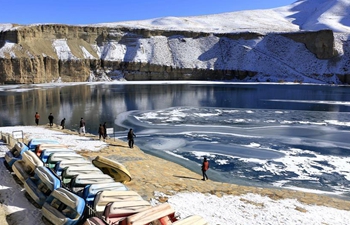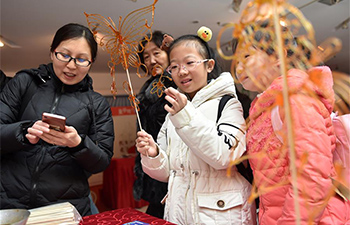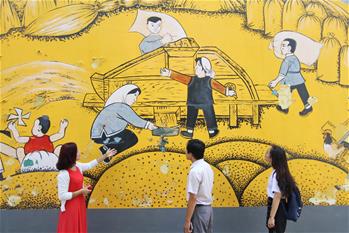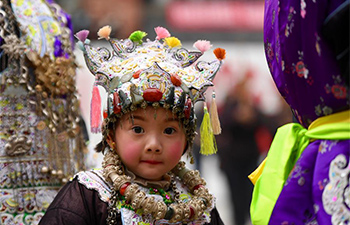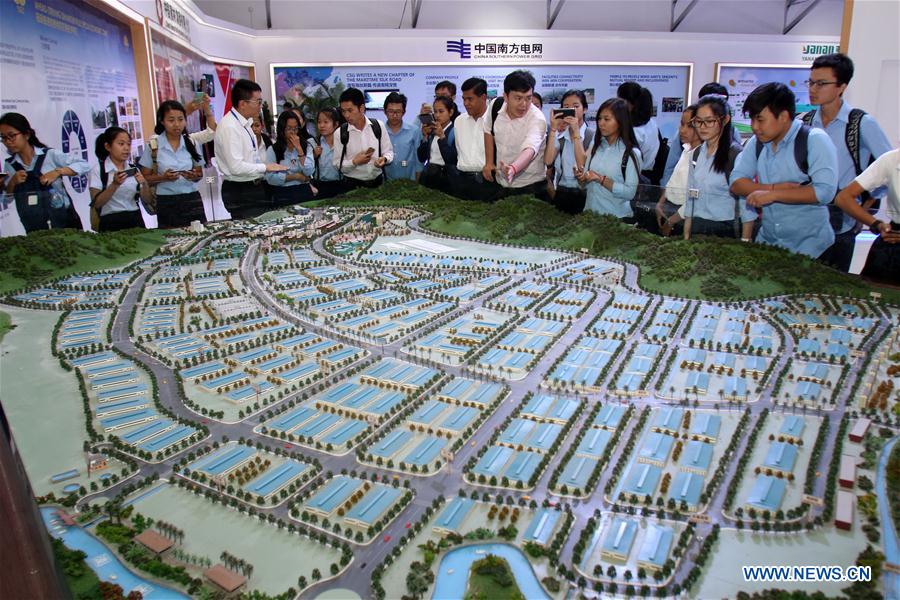
Cambodian university students view an architectural model during a Lancang-Mekong Cooperation (LMC) exhibition in Phnom Penh, Cambodia, Jan. 19, 2018. The 11-day LMC exhibition came to an end successfully here on Saturday, attracting approximately 15,000 visitors, an organizer said. (Xinhua/Sovannara)
by Nguon Sovan, Mao Pengfei
PHNOM PENH, Jan. 20 (Xinhua) -- The 11-day Lancang-Mekong Cooperation (LMC) exhibition came to an end successfully here on Saturday, attracting approximately 15,000 visitors, an organizer said.
Chinese Premier Li Keqiang and Cambodian Prime Minister Samdech Techo Hun Sen as well as leaders of Thailand, Vietnam, Laos, and Myanmar visited the exhibition on Jan. 10 when they attended the second LMC leaders' meeting.
It was classified into two parts. One was the photo exhibition featuring pictures of achievements that the six LMC countries had made since the LMC was initiated three years ago, and the other was the Chinese company exhibition displaying high-tech products and services.
"It's a successful exhibition, attracting a total of about 15,000 visitors, mostly university students," Guo Yinghui, director general of the department of exhibition and events of the China Chamber of International Commerce, told Xinhua.
He said besides the LMC outcomes photo exhibition, 10 giant Chinese firms, including China Railway, China Southern Power Grid, China National Building Material Group, and Huawei Technologies, had showcased their latest technological products and services at the event.
"This exhibition has not only further promoted cooperation among the six Lancang-Mekong countries, but also further enhanced friendly relations between China and Cambodia," he said. "This event also shows solidarity among the six countries toward building a river of shared future and common development."
Sok Siphana, an advisor to the Cambodian government, said the exhibition presented a very modern perspective of how advanced technologies could enhance the well-being of people in Lancang-Mekong countries.
"For Cambodians, it gives a fresh outlook of how modern Cambodia can be if we apply these new developments, which are well-tested in China already," he told Xinhua.
"Cambodia can skip the learning curve and catch up the neighboring countries in term of advanced rail system, smart cities, modern construction methods, and renewable energies. The LMC can make this happens," he added.
Cambodia's Secretary of State and Spokesman for the Council of Ministers Phay Siphan said that the exhibition truly reflected solidarity and unity among the six Lancang-Mekong countries.
"It illustrates strong support and commitment made by the leaders of the six countries in building a river of peace, stability, and sustainable development," he told Xinhua.
Siphan also highly spoke of high-tech products and services in transportation, energy, construction and telecommunications that Chinese firms displayed at the exhibition.
"We're confident that under the LMC, the Lancang-Mekong countries will surely benefit from China's advanced technologies, especially in the development of transport infrastructure such as high-speed trains and buses," he said.
Chheang Vannarith, vice-chairman of the Cambodian Institute for Strategic Studies, said the exhibition enhanced the public awareness of the LMC and brought people and entrepreneurs closer.
"Through the event, business networking opportunities have been promoted," he said. "The core element of the LMC is the promotion of practical cooperation, and we need more concrete projects on the ground that impact people's lives."
Joseph Matthews, director of ASEAN Education Center, said the exhibition created awareness among the LMC countries on how they work together and help each other in the development and improvement of transport infrastructure, energy, telecommunications and other fields.
"This exhibition provides an opportunity to each country to examine and evaluate the pace of technological development in their own country by seeing the devices and machinery showcased at the exhibition," he said.
Matthews, who is also a professor at the Beltei International University in Phnom Penh, said the event helped enhance practical cooperation and coordination among the six countries in the fields of cultural exchanges, transportation, infrastructure development through connectivity, transfer of technical know-how, and future planning.
"In my personal view, this kind of exhibition should be held often in all regional countries including ASEAN on rotated basis," he said. "It provides a learning experience to teachers, students, instructors and people who are working in various fields but unaware of development in their own fields."
He added that it also provided an opportunity to investors to explore new areas of investments in the region.
LMC consists of six countries, namely China, Cambodia, Myanmar, Laos, Thailand and Vietnam. It focuses on five priority areas of cooperation: connectivity, production capacity, cross-border economic cooperation, water resources, as well as agriculture and poverty reduction.
The Lancang River originates on the Qinghai-Tibet plateau in southwest China. It is called the Mekong River as it flows through Myanmar, Laos, Thailand, Cambodia and Vietnam before emptying into the sea.




